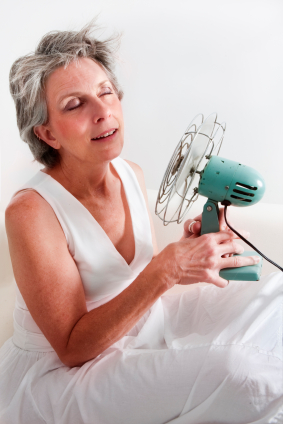Warding Off Hot Flashes

Menopause is the period of life in which a woman may experience hot flashes. This can be a really bothersome issue, especially if the woman experiences them during any time of the day, when the warmth starts to affect her daily duties and sleep.
What causes hot flashes?
Nobody can pinpoint what exactly causes hot flashes. According to some scientists, hormonal changes in the female body during menopause affect the functioning of the human thermostat in the brain, provoking waves of heat. More specifically, the lack of female sexual hormone estrogen in menopause is known to trigger such changes in women of certain age. Different medical problems could also be induced by decrease of estrogen but these patients do not suffer from hot flashes.
Smoking is one of risk factors that may increase the possibility of hot flashes in menopausal women. Additionally, overweight and obese individuals who do not exercise are highly likely to experience more frequent menopause problems than women with healthy weight. Women of African origin usually have greater chances of developing hot flashes compared to those of Caucasian, Japanese or Chinese descent.
Warmth in the upper regions of the body, including the face is the most common symptom during menopause. Patients have also reported facial redness, profuse sweating and cold chills after hot flash episodes. Irregular heartbeats are an additional complaint of menopausal women. Many of them decide to visit and consult their physician when sweating and warmth start to interfere with their sleep, causing insomnia. If such problem persists, the person could be face with memory difficulties. Serious mood changes may well be present as a complication of untreated menopausal hot flashes.
How to ward off hot flashes
Home remedies and lifestyle modifications can be helpful for mild problems. Quit smoking to decrease hot flashes and prevent serious health problems. Keep your body healthy and smoke-free and you will decrease the chances to experience frequent temperature fluctuations, stroke, heart problems and potential development of cancers. Choose healthy food, avoiding anything that might cause hot flashes. Caffeinated drinks, alcohol and spicy food are well known to trigger warmth and sweating in menopausal women, so it could be a good idea to stay away from these.
Additionally, try to dress in layers, so when temperature fluctuations begin you can remove some of the clothes and stay cool. Different relaxation techniques could ease the stress and help with insomnia as well.
Estrogen and progesterone replacement therapy is probably the most effective prescription treatment for menopausal problems, including hot flashes. Some patients may be recommended antidepressants such as fluoxetine, paroxetine or venlafaxine. Doctors may also decide that clonidine or gabapentin are the best drugs for some cases of menopausal difficulties. Prescribed medications usually resolve all medical issues that need the treatment but may cause side effects and unwanted reactions.





